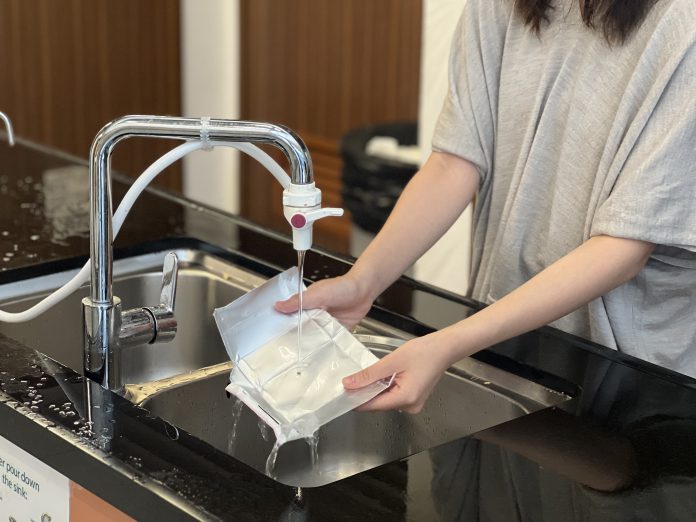Most of the carton boxes in Hong Kong are dumped unwashed.
By Bliss Zhu and Suzana Li
University student Joelle Xu Jiawei drinks paper-packaged lemon tea every day. Instead of washing empty cartons for recycling, she simply dumps them into rubbish bins.
“I don’t know that I have to wash them before recycling. Even if I know, I wouldn’t do it. I think it is time-consuming to wash them. Also, I need to carry this rubbish with me until I can find somewhere to rinse it,” Xu says.
This poses a challenge to Mil Mill, the first factory in Hong Kong which recycles paper cartons into pulps.
“If someone dumps beverage cartons without cleaning it, it will make the whole bag of cartons dirty. We need to clean them before recycling,” marketing manager Gary Cheung Yik-wai says.
“And if recycling bins are too dirty, people may think that those are rubbish bins and dump something else, making it harder for us to do recycling,” Cheung says.
“Also, dirty paper cartons become smelly at collection points, particularly during summertime, attracting insects to enter these cartons, so we need additional staff to clean them,” he adds.

The factory hires three workers to clean these cartons before recycling them. Cheung shares that they employ housewives who want part-time jobs and some with disabilities to do cleaning duty.
“We want to promote not only recycling but equality as well,” he says.
In 2022, Hong Kong’s daily waste of Tetra Pak – the material used to make carton beverage boxes – amounted to 75 tons, which could potentially be recycled into 150,000 standard Tetra Pak milk boxes.
Hong Kong’s paper carton recovery rate was 3.85 per cent in 2022, while that of Japan reached 38.7 per cent for the same year.
“Education is the key reason why environmental awareness is much higher in Japan. Hong Kong does not pay as much attention to ecological education as Japan,” Cheung says.
“From a young age, Japanese children are taught to sort their waste into designated recycling bins. It is crucial for us to have similar initiatives in Hong Kong for sustainability education,” he adds.
The factory now offers workshops and visits to school and hosts a Recycling Bus Campus Environmental Education Activity to promote recycling.

Apart from education, the Environmental Protection Department says that the complexity of packing carton beverages hinders the progress of recycling in Hong Kong.
“Recycling of beverage cartons requires specific technologies for separation. The high recycling cost and low recycling value of beverage cartons currently limit the operating environment of the recycling trade, thus resulting in a relatively lower recycling rate,” a spokesperson of the department says in a written reply.
“We are now working at full steam on the legislative amendment exercise to introduce the Producer Responsibility Scheme on Plastic Beverage Containers and Beverage Cartons. We estimate that the drafting of the legislation can be completed in the first quarter of 2025 and the government will introduce the bill as soon as possible,” the spokesperson adds.

The department started planning a large-scale paper pulping plant in EcoPark, Tuen Mun in 2021. This facility is expected to commence operations in 2025. By then, Hong Kong will have the capacity to process all locally-collected beverage cartons.
The department is also expanding its community recycling network, GREEN@COMMUNITY, by increasing the number of public collection points from 500 to 800 by early 2025.
Edited by Cynthia Chan
Sub-edited by Enya So







































